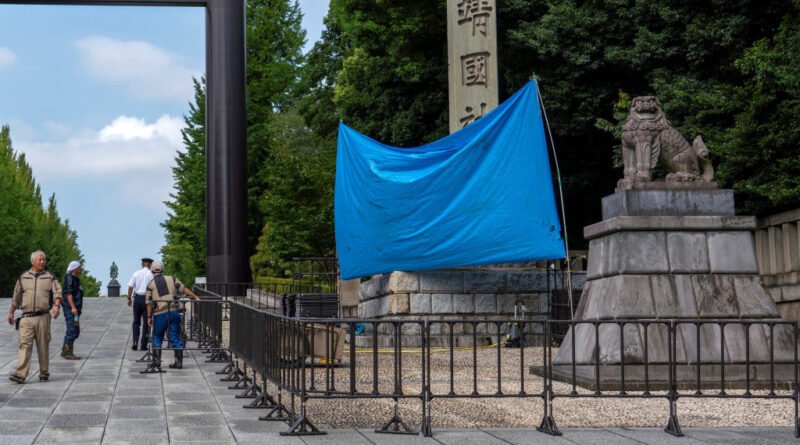NHK of Japan Issues Another Apology for Chinese Announcer’s Off-Script Anti-Japanese Remarks
The Minister of Japan’s Internal Affairs and Communications expressed to reporters that the incident was a violation of the mission of public broadcasting.
Japan Broadcasting Corp. (NHK), a public broadcaster, issued a new apology on Aug. 26 following an off-script anti-Japanese remark made by one of its announcers during a live radio program in Chinese.
Chief Cabinet Secretary Yoshimasa Hayashi deemed the incident as “regrettable” on the same day and called for preventative measures to avoid any recurrence.
A nation-wide broadcast of a new statement highlighted that the announcer’s comments went against Japan’s official stance on the issues and breached the public broadcaster’s duty and programming standards, following NHK President Nobuo Inaba’s initial apology on Aug. 22.
Minister of Internal Affairs and Communications of Japan, Takeaki Matsumoto, emphasized to reporters on Aug. 27 that the incident went against the fundamental mission of public broadcasting.
The Chinese announcer made unauthorized comments on Aug. 19 during a report on the vandalism of a stone pillar at Tokyo’s Yasukuni Shrine. He claimed that the Senkaku Islands had been Chinese territory since ancient times, igniting the longstanding territorial dispute over these islets between China and Japan.
In addition, he mentioned the Nanjing Massacre and “comfort women” pushed into providing sexual services to Japanese soldiers during the Second Sino-Japanese War in the 1930s, in English.
The impromptu broadcast lasted approximately 20 seconds, following which the contracted announcer was terminated.
This incident occurred amidst a series of anti-Japanese events in the past three months, including graffiti attacks at the Yasukuni Shrine and a Chinese individual displaying a banner against Japan’s invasion of China.
The Yasukuni Shrine, known for honoring Japanese soldiers who perished in battle, has fueled tensions between China and Japan due to the inclusion of war criminals at the site.
As noted by Tsukasa Shibuya, President of the Asia-Pacific Exchange Society, the sustained hostility towards the Japanese is a result of the Chinese Communist Party’s (CCP) long-standing propaganda efforts instigating anti-Japanese sentiments.
He mentioned to The Epoch Times that the recent escalation of tensions could be attributed to Japan’s cooperation with the United States to counter CCP aggression in the Indo-Pacific region.
Former NHK Newscaster
Two days after the off-script incident, the announcer, a Chinese national in his 40s, created a verified account on Weibo, a Chinese microblogging platform, and labeled himself as a “former NHK Chinese worker.”
In a post on Aug. 26, he indicated that he had returned to China and highlighted the significance of his off-script broadcast in his decades-long NHK career with the numbers 22 years and 22 seconds.
Multiple Chinese media outlets covered his return and received support from netizens who viewed him as a representative of China, suggesting he could become a prominent influencer.
Akio Yaita, director of the Taipei branch of the Japanese newspaper Sankei Shimbun, cautioned about the commercialization of nationalism by the CCP.
He explained to The Epoch Times that the CCP uses patriotism for commercial purposes, with many Chinese bloggers leveraging patriotism for social media engagement and income growth.
Additionally, Yaita highlighted the CCP’s history of using nationalism to maintain power and provoke public animosity towards Japan through media and education.
China has experienced multiple waves of anti-Japanese demonstrations linked to territorial disputes over the past two decades.
The 2012 protests, triggered by Japan’s acquisition of a part of the disputed Senkaku Islands, led to significant anti-Japanese demonstrations in China, with some protests turning violent.

People take pictures of a Japanese car damaged during a protest against Japan’s “nationalizing” of the disputed Diaoyu Islands, also known as Senkaku Islands in Japan in Xi’an, northwest China’s Shaanxi province, on Sept. 15, 2012. AFP/Getty Images
Chinese authorities later detained a suspect in his 50s, described as unemployed, who is accused of stabbing the three victims.
Yatai expressed concerns that the CCP’s strategy of deflecting blame to foreign entities may lead to heightened anti-Japanese sentiments among the Chinese populace in the future.





